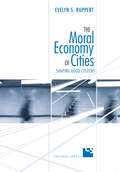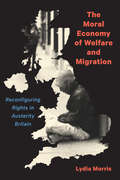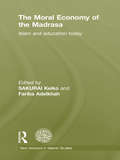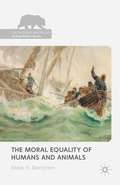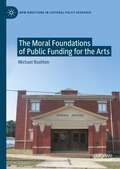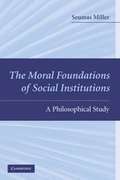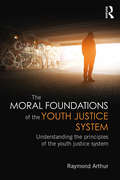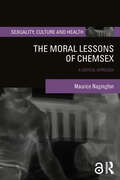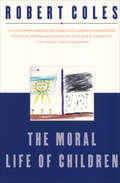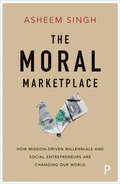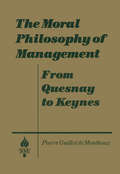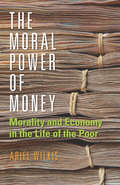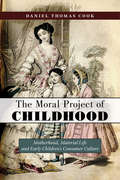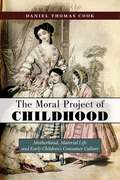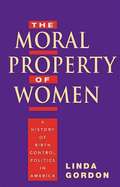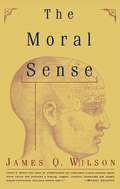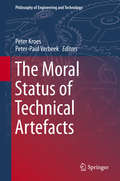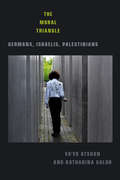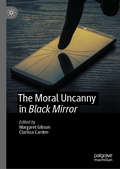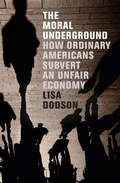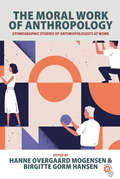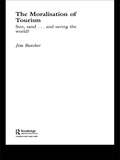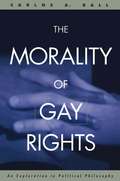- Table View
- List View
The Moral Economy of Cities
by Evelyn S. RuppertWhat makes a good city? This question has long preoccupied groups interested and involved in the making and remaking of city spaces. In The Moral Economy of Cities, Evelyn S. Ruppert contends that the vision of the 'good city' embraced by professionals in the business of city making recognizes the interests of a dominant public, namely middle class consumers, office workers, tourists, and families. This vision stigmatizes certain members of the public like street youth, panhandlers, discount- and low-income shoppers, and the language used to extol the virtues of the good city inherently moralizes social conduct in the city.Using the redevelopment of the Yonge-Dundas intersection in downtown Toronto in the mid-1990s as a case study, Ruppert examines the language of planners, urban designers, architects, and marketing analysts to reveal the extent to which moralization legitimizes these professions in the public eye and buttresses the very projects they produce. Ruppert's conclusion that economic practices are not free from moral investment encourages the considerable task of re-examining the implications of city planning and development worldwide. The Moral Economy of Cities is mandatory reading for urban studies scholars and practitioners, and their critics. Disclaimer: Images removed at the request of the rights holder
The Moral Economy of Welfare and Migration: Reconfiguring Rights in Austerity Britain
by Lydia MorrisBritain's coalition government of 2010–2015 ushered in an enduring age of austerity and a "moral mission" of welfare reform as part of a drive for deficit reduction. Stricter controls were applied to both domestic welfare and international migration and asylum, which were presented as two sides of the same coin. Policy in both areas has engaged a moral message of earned entitlement and invites a sociological approach that examines such policies in combination, alongside their underpinning moral economy.Exploring the idea of a moral economy – from its original focus on popular rebellion at the rising price of corn to more contemporary analysis of measures that seek to impose moral values from above – Lydia Morris examines Britain's reconfigured pattern of rights in the fields of domestic welfare and migration. Those in power have claimed that heightened conditions and sanctions for the benefit-dependent domestic population, both in and out of work, will promote labour market change and reduce demand for low-skilled migrant workers, often EU citizens, whose own access to benefits was curtailed prior to Brexit. Morris traces related political discourse through to the design and implementation of concrete policy measures and maps the diminished access to rights that has emerged, paying particular attention to the boundaries drawn in defining target groups, and the resistance this has provoked.The Moral Economy of Welfare and Migration considers the topology of the whole system to highlight cross-cutting devices of control that have far-reaching implications for how we are governed as a total population.
The Moral Economy of the Madrasa: Islam and Education Today (New Horizons in Islamic Studies)
by Fariba Adelkhah Sakurai KeikoThe revival of madrasas in the 1980s coincided with the rise of political Islam and soon became associated with the "clash of civilizations" between Islam and the West. This volume examines the rapid expansion of madrasas across Asia and the Middle East and analyses their role in society within their local, national and global context. Based on anthropological investigations in Afghanistan, Bangladesh, China, Iran, and Pakistan, the chapters take a new approach to the issue, examining the recent phenomenon of women in madrasas; Hui Muslims in China; relations between the Iran’s Shia seminary after the 1979-Islamic revolution and Shia in Pakistan and Afghanistan; and South Asian madrasas. Emphasis is placed on the increased presence of women in these institutions, and the reciprocal interactions between secular and religious schools in those countries. Taking into account social, political and demographic changes within the region, the authors show how madrasas have been successful in responding to the educational demand of the people and how they have been modernized their style to cope with a changing environment. A timely contribution to a subject with great international appeal, this book will be of great interest to students and scholars of international politics, political Islam, Middle East and Asian studies and anthropology.
The Moral Equality of Humans and Animals (The Palgrave Macmillan Animal Ethics Series)
by Mark H BernsteinReceived opinion has it that humans are morally superior to non-human animals; human interests matter more than the like interests of animals and the value of human lives is alleged to be greater than the value of nonhuman animal lives. Since this belief causes mayhem and murder, its de-mythologizing requires urgent attention.
The Moral Foundations of Public Funding for the Arts (New Directions in Cultural Policy Research)
by Michael RushtonThis book provides a detailed account, and critique, of diverse approaches to the arts funding question, with a focus on the arm’s length arts councils that are the norm in the Anglo-American world. It builds on economic methods, the liberal-egalitarian framework of John Rawls, the communitarian opposition to the liberal framework, the capabilities approach to equality, and the cultural conservatism of Roger Scruton and others. In each case, the book considers the very practical aspect of public funding of the arts, namely, what are the implications for what ought to receive priority, and what parts of the cultural world are best left to their own, private sector, devices. It is not a work of “arts advocacy”. Rather, the book challenges assumptions, and sparks critical debate in the field.
The Moral Foundations of Social Institutions
by Seumas MillerIn this book, Seumas Miller examines the moral foundations of contemporary social institutions. Offering an original general theory of social institutions, he posits that all social institutions exist to realize various collective ends, indeed, to produce collective goods. He analyses key concepts such as collective responsibility and institutional corruption. Miller also provides distinctive special theories of particular institutions, including governments, welfare agencies, universities, police organizations, business corporations, and communications and information technology entities. These theories are philosophical and, thus, foundational and synoptic in character. They are normative accounts of a sampling of contemporary social institutions, not descriptive accounts of all social institutions, both past and present. Miller also addresses various ethical challenges confronting contemporary institutional designers and policymakers, including the renovation of the international financial system, the 'dumbing down' of the media, the challenge of world poverty, and human rights infringements by security agencies combating global terrorism.
The Moral Foundations of the Youth Justice System: Understanding the principles of the youth justice system
by Raymond ArthurWhen is it fair to hold young people criminally responsible? If young people lack the capacity to make a meaningful choice and to control their impulses, should they be held criminally culpable for their behaviour? In what ways is the immaturity of young offenders relevant to their blameworthiness? Should youth offending behaviour be proscribed by criminal law? These are just some of the questions asked in this thoughtful and provocative book. In The Moral Foundations of the Youth Justice System, Raymond Arthur explores international and historical evidence on how societies regulate criminal behaviour by young people, and undertakes a careful examination of the developmental capacities and processes that are relevant to young people’s criminal choices. He argues that the youth justice response needs to be reconceptualised in a context where one of the central objectives of institutions regulating children and young people’s behaviour is to support the interests and welfare of those children. This timely book advocates a revolutionary transformation of the structure and process of contemporary youth justice law: a synthesised and integrated approach that is clearly distinct from that used for dealing with adults. This book is a key resource for students, academics and practitioners across fields including criminal law, youth justice, probation and social work.
The Moral Lessons of Chemsex: A Critical Approach (Sexuality, Culture and Health)
by Maurice NagingtonThis book explores how gay and bi men’s lived experiences of chemsex intersect with its cultural representations. It argues that while normative moral frameworks are often used to talk about chemsex, chemsex sub-cultures contain their own valuable moral frameworks that can provide lessons about some of the most pressing concerns of contemporary society.Drawing from a tradition of scholarship that views queer sub-cultures as having pedagogical value for all of society, Maurice Nagington critiques norms that govern lives in relation to: the interactions of bodies, sex and capitalism, trauma and tragedy, the regulation of boundaries, and the disciplinary apparatuses in modern society. Each chapter takes its lead from themes informed by the analysis of longitudinal interviews conducted over a two-year period by the author and an archive of materials concerning chemsex such as films, soundtracks, health promotion pamphlets, newspaper articles, blogs, and ethnographic field notes. Linking the accounts of interviewees to wider debates about and representations of chemsex, this innovative book develops a cohesive narrative about the moral lessons chemsex can teach us.Contributing to the emerging field of critical chemsex studies, this volume is of interest to advanced students and scholars interested in gender and sexuality studies, sociology of health and illness, medical anthropology, critical public health and criminology, as well those who are involved in chemsex and wish to read and reflect about it as more than just a problem. The Open Access version of this book, available at http://www.taylorfrancis.com, has been made available under a Creative Commons [Attribution-Non Commercial-No Derivatives (CC-BY-NC-ND)] 4.0 license.
The Moral Life of Children (Books That Changed the World)
by Robert ColesAn in-depth investigation from the renowned child psychiatrist and Pulitzer Prize-winning author: “Fascinating.”—Los Angeles Times Book ReviewIn this searching, vivid inquiry, Robert Coles shows how children struggle with questions of moral choice. Bringing to life the voices of children from a rich diversity of backgrounds, including regions plagued by poverty or social unrest, he explores their reactions to movies and stories, their moral conduct, their conversations and relationships with friends and family, and their anxieties about themselves and the fate of the world. Whether they are from the poorest classes of Rio de Janeiro or middle-class America, these children lead lives of intense moral awareness.“What meaning do terms like ‘conscience’ or ‘moral purpose’ hold for malnourished, sick, poorly clothed children in Brazilian slums or South African hovels, children whose main goal is to survive another day? In attempting to answer this question, child psychiatrist Coles shows how children in the most trying circumstances manage to maintain their moral dignity.”—Publishers Weekly
The Moral Marketplace: How Mission-Driven Millennials and Social Entrepreneurs Are Changing Our World
by Asheem SinghEnter the world of the social entrepreneur. A global community of doers, thinkers and leaders who mix business with grass-roots activism to make social change possible. Vinod Kapur created a new breed of chicken that feeds some of the world’s poorest villagers. Betty Makoni empowers young women across Africa through her Girl Child Network. Stephen Burks connects developing world artisans with high fashion brands. They are but three. In this book, author and activist Asheem Singh explores how a movement of tiny ventures evolved into a global humanitarian and financial juggernaut, revealing new ways to fight privilege and inequality, rewire philanthropy, government and even capitalism itself. This is a guide to an exhilarating and inspiring world where, through our giving, campaigning and even through our choices as consumers, we can all play a crucial role in taking on the biggest social challenges of our time.
The Moral Philosophy of Management: From Quesnay to Keynes (Studies In Socio-economics)
by Pierre Guillet MonthouxThis book explores the foundation of European management philosophy at a dramatic moment in European history: the Cold War has ended; Western capitalism has triumphed over communism. The book reflects on the role of business and management that has emerged in Western capitalism and it searches for the roots of moral philosophy and the philosophies of management derived from the history of economic thought. It traces such ideas from the late 18th century works, Quesnay and Smith, down through the 19th century to the present. The closing chapter of the book sets out ten principles for tight management in a socio-economic doctrine of ideal enterprise and good management.
The Moral Power of Money: Morality and Economy in the Life of the Poor
by Ariel WilkisLooking beneath the surface of seemingly ordinary social interactions, The Moral Power of Money investigates the forces of power and morality at play, particularly among the poor. Drawing on fieldwork in a slum of Buenos Aires, Ariel Wilkis argues that money is a critical symbol used to negotiate not only material possessions, but also the political, economic, class, gender, and generational bonds between people. Through vivid accounts of the stark realities of life in Villa Olimpia, Wilkis highlights the interplay of money, morality, and power. Drawing out the theoretical implications of these stories, he proposes a new concept of moral capital based on different kinds, or "pieces," of money. Each chapter covers a different "piece"—money earned from the informal and illegal economies, money lent through family and market relations, money donated with conditional cash transfers, political money that binds politicians and their supporters, sacrificed money offered to the church, and safeguarded money used to support people facing hardships. This book builds an original theory of the moral sociology of money, providing the tools for understanding the role money plays in social life today.
The Moral Project of Childhood: Motherhood, Material Life, and Early Children's Consumer Culture
by Daniel Thomas CookExamines the Protestant origins of motherhood and the child consumer Throughout history, the responsibility for children’s moral well-being has fallen into the laps of mothers. In The Moral Project of Childhood, the noted childhood studies scholar Daniel Thomas Cook illustrates how mothers in the nineteenth-century United States meticulously managed their children’s needs and wants, pleasures and pains, through the material world so as to produce the “child” as a moral project. Drawing on a century of religiously-oriented child care advice in women’s periodicals, he examines how children ultimately came to be understood by mothers—and later, by commercial actors—as consumers. From concerns about taste, to forms of discipline and punishment, to play and toys, Cook delves into the social politics of motherhood, historical anxieties about childhood, and early children’s consumer culture. An engaging read, The Moral Project of Childhood provides a rich cultural history of childhood.
The Moral Project of Childhood: Motherhood, Material Life, and Early Children's Consumer Culture
by Daniel Thomas CookExamines the Protestant origins of motherhood and the child consumer Throughout history, the responsibility for children’s moral well-being has fallen into the laps of mothers. In The Moral Project of Childhood, the noted childhood studies scholar Daniel Thomas Cook illustrates how mothers in the nineteenth-century United States meticulously managed their children’s needs and wants, pleasures and pains, through the material world so as to produce the “child” as a moral project. Drawing on a century of religiously-oriented child care advice in women’s periodicals, he examines how children ultimately came to be understood by mothers—and later, by commercial actors—as consumers. From concerns about taste, to forms of discipline and punishment, to play and toys, Cook delves into the social politics of motherhood, historical anxieties about childhood, and early children’s consumer culture. An engaging read, The Moral Project of Childhood provides a rich cultural history of childhood.
The Moral Property of Women: A History of Birth Control Politics in America
by Linda GordonChoice Magazine's Outstanding Academic Books for 2004The only book to cover the entire history of birth control and the intense controversies about reproduction rights that have raged in the United States for more than 150 years, The Moral Property of Women is a thoroughly updated and revised version of the award-winning historian Linda Gordon's classic history Woman's Body, Woman's Right, originally published in 1976.Arguing that reproduction control has always been central to women's status, The Moral Property of Women shows how opposition to it has long been part of the conservative opposition to gender equality. From its roots in folk medicine and in a campaign so broad it constituted a grassroots social movement at some points in history, to its legitimization through public policy, the widespread acceptance of birth control has involved a major reorientation of sexual values. Gordon puts today's reproduction control controversies--foreign aid for family planning, the abortion debates, teenage pregnancy and childbearing, stem-cell research--into historical perspective and shows how the campaign to legalize abortion is part of a 150-year-old struggle over reproductive rights, a struggle that has followed a circuitous path. Beginning with the "folk medicine" of birth control, Gordon discusses how the backlash against the first women's rights movement of the 1800s prohibited both abortion and contraception about 130 years ago. She traces the campaign for legal reproduction control from the 1870s to the present and argues that attitudes toward birth control have been inseparable from family values, especially standards about sexuality and gender equality. Highlighting both leaders and followers in the struggle, The Moral Property of Women chronicles the contributions of well-known reproduction control pioneers such as Elizabeth Cady Stanton, Margaret Sanger, and Emma Goldman, as well as lesser- known campaigners including the utopian socialist Robert Dale Owen, the three doctors Foote--Edward Bliss Foote, Edward Bond Foote, and Mary Bond Foote--the civil libertarian Mary Ware Dennett, and the daring Jane project of the 1970s, in which Chicago women's liberation activists performed illegal abortions.
The Moral Sense
by James Q. WilsonAre human beings naturally endowed with a conscience? Or is morality artificially acquired through social pressure and instruction? Most people assume that modern science proves the latter. Further, most of our current social policies are based upon this "scientific" view of the sources of morality. In this book, however, James Q. Wilson seeks to reconcile traditional ideas with a range of important empirical research into the sources of human behaviour over the last 50 years. Marshalling evidence drawn from diverse scientific disciplines, including animal behaviour, anthropology, evolutionary theory, biology, endocrinology, brain science, genetics, primatology, education and psychology, Wilson shows that the facts about the origin and development of moral reasoning are not at odds with traditional views predating Freud, Darwin and Marx. Our basic sense of right and wrong actually does have a biological and behavioural origin. This "moral sense" arises from the infant's innate sociability, though it must also be nurtured by parental influence. Thus, this book revives ancient traditions of moral and ethical argument that go back to Aristotle, and reunifies the separate streams of philosophical and scientific knowledge that for so long were regarded as unbridgeable.
The Moral Sense
by James Q. WilsonAre human beings naturally endowed with a conscience? Or is morality artificially acquired through social pressure and instruction? Most people assume that modern science proves the latter. Further, most of our current social policies are based upon this "scientific" view of the sources of morality. In this book, however, James Q. Wilson seeks to reconcile traditional ideas with a range of important empirical research into the sources of human behavior over the last fifty years. Marshalling evidence drawn from diverse scientific disciplines, including animal behavior, anthropology, evolutionary theory, biology, endocrinology, brain science, genetics, primatology, education and psychology, Wilson shows that the facts about the origin and development of moral reasoning are not at odds with traditional views predating Freud, Darwin and Marx. Our basic sense of right and wrong actually does have a biological and behavioral origin. This "moral sense" arises from the infant's innate sociability, though it must also be nurtured by parental influence. Thus, this book revives ancient traditions of moral and ethical argument that go back to Aristotle, and reunifies the separate streams of philosophical and scientific knowledge that for so long were regarded as unbridgeable.
The Moral Status of Technical Artefacts
by Peter-Paul Verbeek Peter KroesThis book considers the question: to what extent does it make sense to qualify technical artefacts as moral entities? The authors' contributions trace recent proposals and topics including instrumental and non-instrumental values of artefacts, agency and artefactual agency, values in and around technologies, and the moral significance of technology. The editors' introduction explains that as 'agents' rather than simply passive instruments, technical artefacts may actively influence their users, changing the way they perceive the world, the way they act in the world and the way they interact with each other. This volume features the work of various experts from around the world, representing a variety of positions on the topic. Contributions explore the contested discourse on agency in humans and artefacts, defend the Value Neutrality Thesis by arguing that technological artefacts do not contain, have or exhibit values, or argue that moral agency involves both human and non-human elements. The book also investigates technological fields that are subject to negative moral valuations due to the harmful effects of some of their products. It includes an analysis of some difficulties arising in Artificial Intelligence and an exploration of values in Chemistry and in Engineering. The Moral Status of Technical Artefacts is an advanced exploration of the various dimensions of the relations between technology and morality
The Moral Triangle: Germans, Israelis, Palestinians
by Katharina Galor Sa'ed AtshanBerlin is home to Europe’s largest Palestinian diaspora community and one of the world’s largest Israeli diaspora communities. Germany’s guilt about the Nazi Holocaust has led to a public disavowal of anti-Semitism and strong support for the Israeli state. Meanwhile, Palestinians in Berlin report experiencing increasing levels of racism and Islamophobia. In The Moral Triangle Sa’ed Atshan and Katharina Galor draw on ethnographic fieldwork and interviews with Israelis, Palestinians, and Germans in Berlin to explore these asymmetric relationships in the context of official German policies, public discourse, and the private sphere. They show how these relationships stem from narratives surrounding moral responsibility, the Holocaust, the Israel/Palestine conflict, and Germany’s recent welcoming of Middle Eastern refugees. They also point to spaces for activism and solidarity among Germans, Israelis, and Palestinians in Berlin that can help foster restorative justice and account for multiple forms of trauma. Highlighting their interlocutors’ experiences, memories, and hopes, Atshan and Galor demonstrate the myriad ways in which migration, trauma, and contemporary state politics are inextricably linked.
The Moral Uncanny in Black Mirror
by Margaret Gibson Clarissa CardenThis erudite volume examines the moral universe of the hit Netflix show Black Mirror. It brings together scholars in media studies, cultural studies, anthropology, literature, philosophy, psychology, theatre and game studies to analyse the significance and reverberations of Charlie Brooker’s dystopian universe with our present-day technologically mediated life world. Brooker’s ground-breaking Black Mirror anthology generates often disturbing and sometimes amusing future imaginaries of the dark side of ubiquitous screen life, as it unleashes the power of the uncanny. This book takes the psychoanalytic idea of the uncanny into a moral framework befitting Black Mirror’s dystopian visions. The volume suggests that the Black Mirror anthology doesn’t just make the viewer feel, on the surface, a strange recognition of closeness to some of its dystopian scenarios, but also makes us realise how very fragile, wavering, fractured, and uncertain is the human moral compass.
The Moral Underground: How Ordinary Americans Subvert an Unfair Economy
by Lisa DodsonA &“fascinating&” look at the disconnect between corporate policies and workers&’ real lives—and the everyday heroes who try to help (Publishers Weekly). For the poor, there are challenges every day that they don&’t have extra money to solve: a sick kid, car trouble, an unexpected dentist bill. The obstacles can make it harder to hold on to a job—but a job loss would be catastrophic. However, there are countless unsung heroes who bend or break the rules to help those millions of Americans with impossible schedules, paychecks, and lives make it from paycheck to paycheck. This book tells their stories. Whether it&’s a nurse choosing to treat an uninsured child, a supervisor deciding to overlook infractions, or a restaurant manager sneaking food to a worker&’s children, middle-class Americans are secretly refusing to be complicit in a fundamentally unfair system that puts a decent life beyond the reach of the working poor. In this tale of a kind of economic disobedience—told in whispers to Lisa Dodson over the course of eight years of research across the country—hundreds of supervisors, teachers, and health care professionals describe intentional acts of defiance that together tell the story of a quiet revolt, of a moral underground that has grown in response to an immoral economy. It documents a whole new phenomenon—people reaching across America&’s economic fault line—and provides an account of the human consequences and lives behind the business-page headlines. &“If only this book had been published in 2007. Then the hundreds of people interviewed by Lisa Dodson would have been able to pass along an important piece of advice: What&’s good for business is not necessarily good for America.&” —Time
The Moral Work of Anthropology: Ethnographic Studies of Anthropologists at Work (Anthropology at Work #2)
by Hanne Overgaard Mogensen Birgitte Gorm HansenLooking at anthropologists at work, this book investigates what kind of morality they perform in their occupations and what the impact of this morality is. The book includes ethnographic studies in four professional arenas: health care, business, management and interdisciplinary research. The discussion is positioned at the intersection of ‘applied or public anthropology’ and ‘the anthropology of ethics’ and analyses the ways in which anthropologists can carry out ‘moral work’ both inside and outside of academia.
The Moral Work of Anthropology: Ethnographic Studies of Anthropologists at Work (Anthropology at Work #2)
by Hanne Overgaard Mogensen Birgitte Gorm HansenLooking at anthropologists at work, this book investigates what kind of morality they perform in their occupations and what the impact of this morality is. The book includes ethnographic studies in four professional arenas: health care, business, management and interdisciplinary research. The discussion is positioned at the intersection of ‘applied or public anthropology’ and ‘the anthropology of ethics’ and analyses the ways in which anthropologists can carry out ‘moral work’ both inside and outside of academia.
The Moralisation of Tourism: Sun, Sand... and Saving the World? (Contemporary Geographies of Leisure, Tourism and Mobility)
by Jim ButcherTourism is no longer an innocent pleasure. It has been interpreted and reinterpreted as an activity which is ultimately damaging to receiving cultures and the environment. 'New' forms of tourism, such as ecotourism, alternative tourism, community tourism and ethical tourism, have been presented as morally superior alternatives to the package holiday, yet ironically, even advocates of these new, ethical tourism brands are increasingly subject to criticisms, not dissimilar to those they themselves level against package holidays. Using a host of international examples from the industry, the media and non-governmental organisations, this intriguing book examines what the advocates of 'new tourism' see as being wrong with mass tourism, looks critically at the claims made for the new alternatives and makes a case for guilt-free holidays. The only book on the market to provide a sustained critique of conventional mass tourism’s own critics, Butcher offers a counterpoint to the moral rhetoric steadily turning travellers into guilty tourists.
The Morality of Gay Rights: An Exploration in Political Philosophy
by Carlos BallIn The Morality of Gay Rights, Ball presents a comprehensive exploration of the connection between gay rights and political philosophy. He discusses the writing of contemporary political and legal philosophers-including Rawls, Walzer, Nussbaum, Sandel, Rorty and Dworkin-to evaluate how their theoretical frameworks fit the specific gay rights controversies, such as same-sex marriage and parenting by lesbians and gay men, that are part of our nation's political and legal debates.
